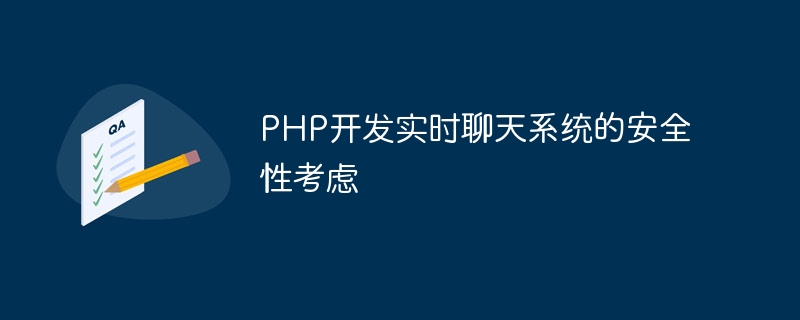Home >Backend Development >PHP Tutorial >Security considerations for developing real-time chat systems with PHP
Security considerations for developing real-time chat systems with PHP
- WBOYWBOYWBOYWBOYWBOYWBOYWBOYWBOYWBOYWBOYWBOYWBOYWBOriginal
- 2023-08-27 13:09:311168browse

Security considerations for developing real-time chat systems with PHP
With the rapid development of the Internet, real-time chat applications are becoming more and more common. However, there are many security considerations involved in the development of live chat systems. In this article, we will discuss some security issues that need to be paid attention to when developing a real-time chat system in PHP, and provide some code examples to help developers improve the security of the system.
- Filtering input and output data
In any web application that interacts with users, filtering of input data is crucial. This is especially important for live chat systems. Developers should use appropriate filtering and validation mechanisms to check user input and output data to prevent potential security vulnerabilities.
The following is a sample code for filtering user-entered data:
$input = $_POST['message']; $filtered_input = filter_var($input, FILTER_SANITIZE_STRING);
This code uses the filter_var() function to filter user-entered data. message and use the FILTER_SANITIZE_STRING parameter to remove any HTML tags or special characters. This prevents users from attacking the system by entering malicious code.
At the same time, developers should use appropriate encoding mechanisms for output data to prevent attacks such as XSS (cross-site scripting attacks). The following is a sample code that uses the htmlspecialchars() function to encode the output data:
$output = $chat_message['message']; $encoded_output = htmlspecialchars($output); echo $encoded_output;
- Preventing Cross-site Request Forgery (CSRF)
Cross-site request forgery is a A common web application security vulnerability that allows an attacker to perform unauthorized operations by forging requests. To prevent CSRF attacks, developers can add a randomly generated token to the form and verify the token's validity when processing the request.
The following is a sample code to generate and verify a CSRF token:
// 生成令牌
$token = bin2hex(openssl_random_pseudo_bytes(16));
$_SESSION['csrf_token'] = $token;
// 在表单中添加令牌
echo '<input type="hidden" name="csrf_token" value="' . $token . '">';
// 验证令牌
if (isset($_POST['csrf_token']) && $_POST['csrf_token'] === $_SESSION['csrf_token']) {
// 处理请求
}- Database Security Considerations
For live chat systems, data security Very important. Developers should use prepared statements and parameterized queries to prevent SQL injection attacks. The following is a sample code for performing a secure database query:
$message = $_POST['message'];
// 使用预处理语句和参数化查询
$stmt = $pdo->prepare("INSERT INTO chat_messages (message) VALUES (:message)");
$stmt->bindParam(':message', $message);
$stmt->execute();This code uses the PDO (PHP Data Objects) extension to interact with the database and uses prepared statements and parameterization Query to insert chat messages. This prevents attackers from performing SQL injection attacks via malicious input.
Summary:
When developing a PHP real-time chat system, security is an important factor that must be considered. The security of your live chat system can be improved by filtering input and output data, preventing cross-site request forgery, and using secure database queries. Developers should follow best practices to ensure system security and continually update and fix potential security vulnerabilities.
The above is the detailed content of Security considerations for developing real-time chat systems with PHP. For more information, please follow other related articles on the PHP Chinese website!
Related articles
See more- phpstudy usage instructions tutorial
- Quickly build a simple QQ robot with PHP
- Application practice of swoole development functions in real-time chat applications
- PHP develops cloud storage and file sharing support for real-time chat function
- PHP develops file transfer and multimedia support for real-time chat system

